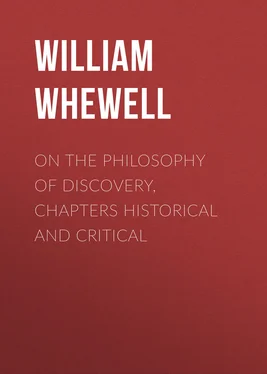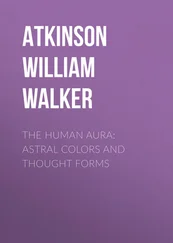William Whewell - On the Philosophy of Discovery, Chapters Historical and Critical
Здесь есть возможность читать онлайн «William Whewell - On the Philosophy of Discovery, Chapters Historical and Critical» — ознакомительный отрывок электронной книги совершенно бесплатно, а после прочтения отрывка купить полную версию. В некоторых случаях можно слушать аудио, скачать через торрент в формате fb2 и присутствует краткое содержание. Жанр: foreign_prose, foreign_religion, Философия, foreign_psychology, foreign_antique, на английском языке. Описание произведения, (предисловие) а так же отзывы посетителей доступны на портале библиотеки ЛибКат.
- Название:On the Philosophy of Discovery, Chapters Historical and Critical
- Автор:
- Жанр:
- Год:неизвестен
- ISBN:нет данных
- Рейтинг книги:5 / 5. Голосов: 1
-
Избранное:Добавить в избранное
- Отзывы:
-
Ваша оценка:
- 100
- 1
- 2
- 3
- 4
- 5
On the Philosophy of Discovery, Chapters Historical and Critical: краткое содержание, описание и аннотация
Предлагаем к чтению аннотацию, описание, краткое содержание или предисловие (зависит от того, что написал сам автор книги «On the Philosophy of Discovery, Chapters Historical and Critical»). Если вы не нашли необходимую информацию о книге — напишите в комментариях, мы постараемся отыскать её.
On the Philosophy of Discovery, Chapters Historical and Critical — читать онлайн ознакомительный отрывок
Ниже представлен текст книги, разбитый по страницам. Система сохранения места последней прочитанной страницы, позволяет с удобством читать онлайн бесплатно книгу «On the Philosophy of Discovery, Chapters Historical and Critical», без необходимости каждый раз заново искать на чём Вы остановились. Поставьте закладку, и сможете в любой момент перейти на страницу, на которой закончили чтение.
Интервал:
Закладка:
8. Nor is there any wavering or vagueness in Bacon's assertion of this important truth. He repeats it over and over again; illustrates it by a great number of the most lively metaphors and emphatic expressions. Thus he speaks of the successive floors ( tabulata ) of induction; and speaks of each science as a pyramid 170 170 Aug. Sc. Lib. iii. c. 4. p. 194. So in other places, as Nov. Org. i. Aph. 104. "De scientiis tum demum bene sperandum est quando per scalam veram et per gradus continuos, et non intermissos aut hiulcos a particularibus ascendetur ad axiomata minora, et deinde ad media, alia aliis superiora, et postremo demum ad generalissima."
which has observation and experience for its basis. No images can better exhibit the relation of general and particular truths, as our own Inductive Tables may serve to show.
(IV.) 9. Comparison of the New and Old Method. Again; not less remarkable is his contrasting this true Method of Science (while it was almost, as he says, yet untried) with the ancient and vicious Method , which began, indeed, with facts of observation, but rushed at once and with no gradations, to the most general principles. For this was the course which had been actually followed by all those speculative reformers who had talked so loudly of the necessity of beginning our philosophy from experience. All these men, if they attempted to frame physical doctrines at all, had caught up a few facts of observation, and had erected a universal theory upon the suggestions which these offered. This process of illicit generalization, or, as Bacon terms it, Anticipation of Nature ( anticipatio naturæ ), in opposition to the Interpretation of Nature, he depicts with singular acuteness, in its character and causes. "These two ways," he says 171 171 Nov. Org. 1. Aph. 22.
"both begin from sense and particulars; but their discrepancy is immense. The one merely skims over experience and particulars in a cursory transit; the other deals with them in a due and orderly manner. The one, at its very outset, frames certain general abstract principles, but useless; the other gradually rises to those principles which have a real existence in nature."
"The former path," he adds 172 172 Ib. Aph. 20.
, "that of illicit and hasty generalization, is one which the intellect follows when abandoned to its own impulse; and this it does from the requisitions of logic. For the mind has a yearning which makes it dart forth to generalities, that it may have something to rest in; and after a little dallying with experience, becomes weary of it; and all these evils are augmented by logic, which requires these generalities to make a show with in its disputations."
"In a sober, patient, grave intellect," he further adds, "the mind, by its own impulse, (and more especially if it be not impelled by the sway of established opinions) attempts in some measure that other and true way, of gradual generalization; but this it does with small profit; for the intellect, except it be regulated and aided, is a faculty of unequal operation, and altogether unapt to master the obscurity of things."
The profound and searching wisdom of these remarks appears more and more, as we apply them to the various attempts which men have made to obtain knowledge; when they begin with the contemplation of a few facts, and pursue their speculations, as upon most subjects they have hitherto generally done; for almost all such attempts have led immediately to some process of illicit generalization, which introduces an interminable course of controversy. In the physical sciences, however, we have the further inestimable advantage of seeing the other side of the contrast exemplified: for many of them, as our inductive Tables show us, have gone on according to the most rigorous conditions of gradual and successive generalization; and in consequence of this circumstance in their constitution, possess, in each part of their structure, a solid truth, which is always ready to stand the severest tests of reasoning and experiment.
We see how justly and clearly Bacon judged concerning the mode in which facts are to be employed in the construction of science. This, indeed, has ever been deemed his great merit: insomuch that many persons appear to apprehend the main substance of his doctrine to reside in the maxim that facts of observation, and such facts alone, are the essential elements of all true science.
(V.) 10. Ideas are necessary. —Yet we have endeavoured to establish the doctrine that facts are but one of two ingredients of knowledge both equally necessary;—that Ideas are no less indispensable than facts themselves; and that except these be duly unfolded and applied, facts are collected in vain. Has Bacon then neglected this great portion of his subject? Has he been led by some partiality of view, or some peculiarity of circumstances, to leave this curious and essential element of science in its pristine obscurity? Was he unaware of its interest and importance?
We may reply that Bacon's philosophy, in its effect upon his readers in general, does not give due weight or due attention to the ideal element of our knowledge. He is considered as peculiarly and eminently the asserter of the value of experiment and observation. He is always understood to belong to the experiential, as opposed to the ideal school. He is held up in contrast to Plato and others who love to dwell upon that part of knowledge which has its origin in the intellect of man.
11. Nor can it be denied that Bacon has, in the finished part of his Novum Organon , put prominently forwards the necessary dependence of all our knowledge upon Experience, and said little of its dependence, equally necessary, upon the Conceptions which the intellect itself supplies. It will appear, however, on a close examination, that he was by no means insensible or careless of this internal element of all connected speculation. He held the balance, with no partial or feeble hand, between phenomena and ideas. He urged the Colligation of Facts, but he was not the less aware of the value of the Explication of Conceptions.
12. This appears plainly from some remarkable Aphorisms in the Novum Organon . Thus, in noticing the causes of the little progress then made by science 173 173 1 Ax. 15.
, he states this:—"In the current Notions, all is unsound, whether they be logical or physical. Substance , quality , action , passion , even being , are not good Conceptions; still less are heavy , light , dense , rare , moist , dry , generation , corruption , attraction , repulsion , element , matter , form , and others of that kind; all are fantastical and ill-defined." And in his attempt to exemplify his own system, he hesitates 174 174 Nov. Org. lib. ii. Aph. 19.
in accepting or rejecting the notions of elementary , celestial , rare , as belonging to fire, since, as he says, they are vague and ill-defined notions ( notiones vagæ nec bene terminatæ ). In that part of his work which appears to be completed, there is not, so far as I have noticed, any attempt to fix and define any notions thus complained of as loose and obscure. But yet such an undertaking appears to have formed part of his plan; and in the Abecedarium Naturæ 175 175 Inst. Mag. par. iii. (vol. viii. p. 244).
, which consists of the heads of various portions of his great scheme, marked by letters of the alphabet, we find the titles of a series of dissertations "On the Conditions of Being," which must have had for their object the elucidation of divers Notions essential to science, and which would have been contributions to the Explication of Conceptions, such as we have attempted in a former part of this work. Thus some of the subjects of these dissertations are;—Of Much and Little;—Of Durable and Transitory;—Of Natural and Monstrous;—Of Natural and Artificial. When the philosopher of induction came to discuss these, considered as conditions of existence , he could not do otherwise than develope, limit, methodize, and define the Ideas involved in these Notions, so as to make them consistent with themselves, and a fit basis of demonstrative reasoning. His task would have been of the same nature as ours has been, in that part of this work which treats of the Fundamental Ideas of the various classes of sciences.
Интервал:
Закладка:
Похожие книги на «On the Philosophy of Discovery, Chapters Historical and Critical»
Представляем Вашему вниманию похожие книги на «On the Philosophy of Discovery, Chapters Historical and Critical» списком для выбора. Мы отобрали схожую по названию и смыслу литературу в надежде предоставить читателям больше вариантов отыскать новые, интересные, ещё непрочитанные произведения.
Обсуждение, отзывы о книге «On the Philosophy of Discovery, Chapters Historical and Critical» и просто собственные мнения читателей. Оставьте ваши комментарии, напишите, что Вы думаете о произведении, его смысле или главных героях. Укажите что конкретно понравилось, а что нет, и почему Вы так считаете.












